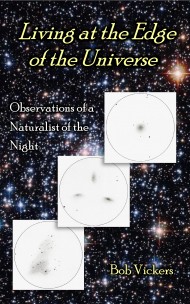The following Galaxy Groups and Clusters observations are from late summer through early fall 2014.
The first, Additional Group #41 (aka the NGC 6211 Group), is from September. This group showed four galaxies in an 11′ long chain, more or less evenly spaced, running SW to NE. At the SW end of the chain, the brightest of these, NGC 6211, was visible with direct vision as a slightly elongated halo surrounding a brighter core and a dim, nearly stellar, nucleus. The other three galaxies were much dimmer faint fuzzies.
Here are two observations from a very clear night in October. First is Hickson 97, a small clump of galaxies consisting of one bright one (IC 5357) surrounded by several smaller and dimmer ones.
The second is Abell #50 (2666), a cluster of galaxies in Pegasus. I could see a zig-zag chain of galaxies, one (NGC 7768 ) slightly elongated NNE/SSW and a bit brighter than the others. I spotted seven galaxies out of this cluster.
The next three GG&C’s were observed under clear but humid conditions at the October Twin Lakes Star Party at Pennyrile State Park in Kentucky. First is Hickson 4. At -21.4 degrees, it was pretty low in the south. I could only see one out of the five listed galaxies and it was extremely dim.
Second is Hickson 91. Again at -27.8 degrees it was very low in the south. I saw two out of the four listed galaxies, one (NGC 7214) fairly bright and the other (M-5-52-36) pretty dim.
The third GG&C at TLSP was Hickson 90, even lower in the south at -31.9 degrees. However, these were all brighter 12th magnitude galaxies, and I was able to see all four listed. They appeared as a short chain of galaxies with two (NGC 7176 & NGC 7174) superimposed at the southern end of the chain. These two may be interacting.
The last group for this update was actually briefly observed at the TLSP in Kentucky but I was forced to curtail my observations and sketching because of the heavy dew. I re-observed a couple of days later back at home however I could only spot two out of the four listed galaxies. Those two were elongated and nearly touching (with a dim field star in between), giving the configuration a stubby “hockey stick” shape. Their magnitudes were listed as 13.7 and 15.7 while the two I could not see were listed as 16.2 and 17.2.


